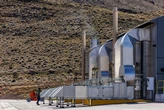The Mojave Micro Mill just broke ground in the Mojave Desert about 85 miles from downtown Los Angeles. It’ll be the first steel mill to open in California in more than half a century when it begins production in two years.
More notable, it’ll do so using local sun and wind power, making it the first self-powered, net-zero steel mill in the country.
Mojave Micro will make rebar—the thin rods of steel used to reinforce concrete walls and floors—out of recycled scrap steel using a net-zero manufacturing process. Eric Benson, CEO of Pacific Steel Group, which will operate the plant, said the company had started to strategize about a new facility a few years ago. Since power remains one of the most expensive inputs in the steelmaking process, he wondered whether a mill could be placed right next to one of these solar farms.
Due to its remote location in the high desert, where there’s plenty of land, the 174-acre Mojave Micro site will include 63 acres of dedicated solar panels, batteries, and wind turbines that will be able to meet the power needs of the plant. The plant is hooked up to the grid in case it needs backup power, but will also install a carbon capture system for times when it runs on grid power, which Pacific Steel says will net out carbon emissions. Benson estimates the plant will be able to run all of its electric arc furnaces on its own power 85% of the time. The company predicts that when it’s fully operational in early 2027, the mill will have the ability to produce 450,000 tons of rebar per year.
Mojave Micro saves emissions in other ways, too. Most of California’s 4.3 million tons of scrap metal is shipped out of state to other mills in the Southwest, and then trucked back to big markets like Los Angeles. The transit costs of moving such heavy material can run $100 per ton. Being able to offer scrap dealers a place to recycle steel that’s just a short drive from L.A.—accessible by truck instead of train—will dramatically cut down on transportation emissions.
The steel industry, which has traditionally run on fossil fuels like coal, generates about 7% of global emissions. In recent years, environmental groups and startups have pushed to develop more green methods of making steel, powered by hydropower and renewables. Startup Boston Metals recently figured out a process to make virgin steel using electricity. The Center for American Progress argues that investment in domestic green steel production can help the U.S. industry adapt to the future and grow out the nation’s industrial base, especially as it looks to build more microchip plants and manufacturing sites.
Mojave Micro also makes a case for more self-contained industrial facilities. With the robust renewable power available in the Mojave (another massive solar farm is located just across the street from the mill’s future home) companies could set up their own power systems and supply everything their factories need, without worrying about grid connections or local power capacity. The current rush for data centers, for instance, has been hampered by the need to increase local power generation and transmission capacity. A plant like Mojave Micro will have all the power infrastructure it needs.
The effort also shows the value of industrial recycling. With tariffs upending supply chains, a similar kind of factory and process could be used to, say, recycle lithium-ion batteries from electric vehicles.
Pacific Steel, which currently supplies a quarter of California’s rebar, believes this new plant will not only enable it to sell greener steel at the same price as competitors but also to steal market share. California state law mandates that state-funded building projects use the greenest possible materials; Pacific Steel’s net-zero rebar will give it a big advantage, and could drive competitors to match its sustainable process.
William Sonneborn, president of Generate, a green investment fund that provided $200 million to help build the plant, believes Mojave Micro is a model that will be copied. He says that some corporations concerned about their environmental footprints, like Walmart, have been looking for greener building materials, seeking to reduce what are known as Scope 3 emissions. Pacific Steel’s new mill aims to help them do just that, at a competitive price.
“We love the idea,” Sonneborn said, “because it sets a standard and it creates a market for the United States because of the design of the technology.”









No comments